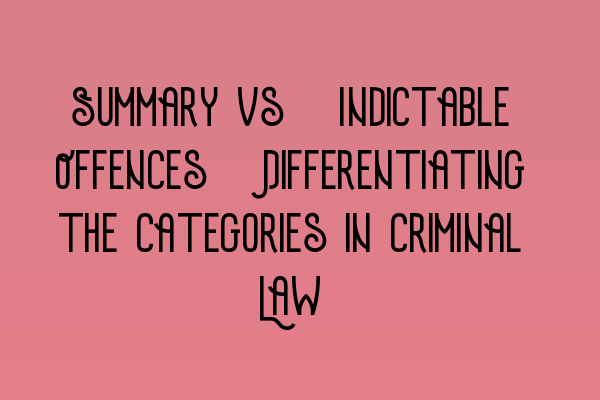Summary vs. Indictable Offences: Differentiating the Categories in Criminal Law
Understanding the various categories of offences in criminal law is essential for both legal practitioners and individuals involved in the justice system. Two main categories of offences are summary offences and indictable offences. In this article, we will explore the differences between these two categories and provide insights into their significance in English criminal law.
Summary Offences
Summary offences are typically less serious cases that are heard in the lower courts, such as Magistrates’ Courts. These offences are often related to minor infractions and carry less severe penalties compared to indictable offences. Examples of summary offences include petty theft, public disorder, and traffic violations.
Summary offences are usually dealt with quickly and efficiently by a magistrate without a jury. This expedited process helps the courts manage a high volume of cases and ensures a more efficient justice system. However, it is crucial to note that some summary offences can be more serious and may carry harsher penalties depending on the circumstances.
Indictable Offences
Indictable offences, on the other hand, are more serious criminal offences and are typically tried in higher courts, such as the Crown Court. These offences include serious crimes such as murder, rape, and large-scale fraud. Unlike summary offences, indictable offences often involve complex legal issues and require a more thorough investigation and trial process.
In cases of indictable offences, the defendant is entitled to a trial by jury, ensuring a fair and impartial judgment. This jury trial allows for a broader scope of evidence to be presented and a more comprehensive examination of the case. It also provides the accused with the opportunity to have their case heard by their peers and offers greater transparency in the judicial process.
Differentiating Factors
One key factor that differentiates summary and indictable offences is their severity. Summary offences are generally considered less severe and carry lighter penalties, while indictable offences are more grave and often result in lengthier prison sentences. The complexity of the legal process is also a distinguishing factor, with summary offences typically having shorter and simpler proceedings compared to the more intricate nature of indictable offences.
In need of SQE 1 Practice Exam Questions? Our firm provides comprehensive SQE 1 Practice Exam Questions to help you prepare for the exam and assess your knowledge.
Implications for Legal Practitioners
For legal practitioners, understanding the differences between summary and indictable offences is crucial for providing appropriate legal advice to clients and representing them effectively in court. Different categories of offences require different legal strategies and approaches.
If you are preparing for the SQE exams, it is important to have a solid grasp of criminal law, including the classification of offences. Our SQE 2 Preparation Courses are designed to equip you with the knowledge and skills needed to excel in your legal career.
Conclusion
In summary, summary offences and indictable offences represent two distinct categories in criminal law. While summary offences are generally less severe and are handled in lower courts, indictable offences are more serious and require extensive legal proceedings in higher courts. Understanding the differences between these categories is essential for legal practitioners and individuals involved in the justice system.
To learn more about SQE preparation and exam dates, explore our SQE 1 Preparation Courses and stay updated with the SRA SQE Exam Dates.
